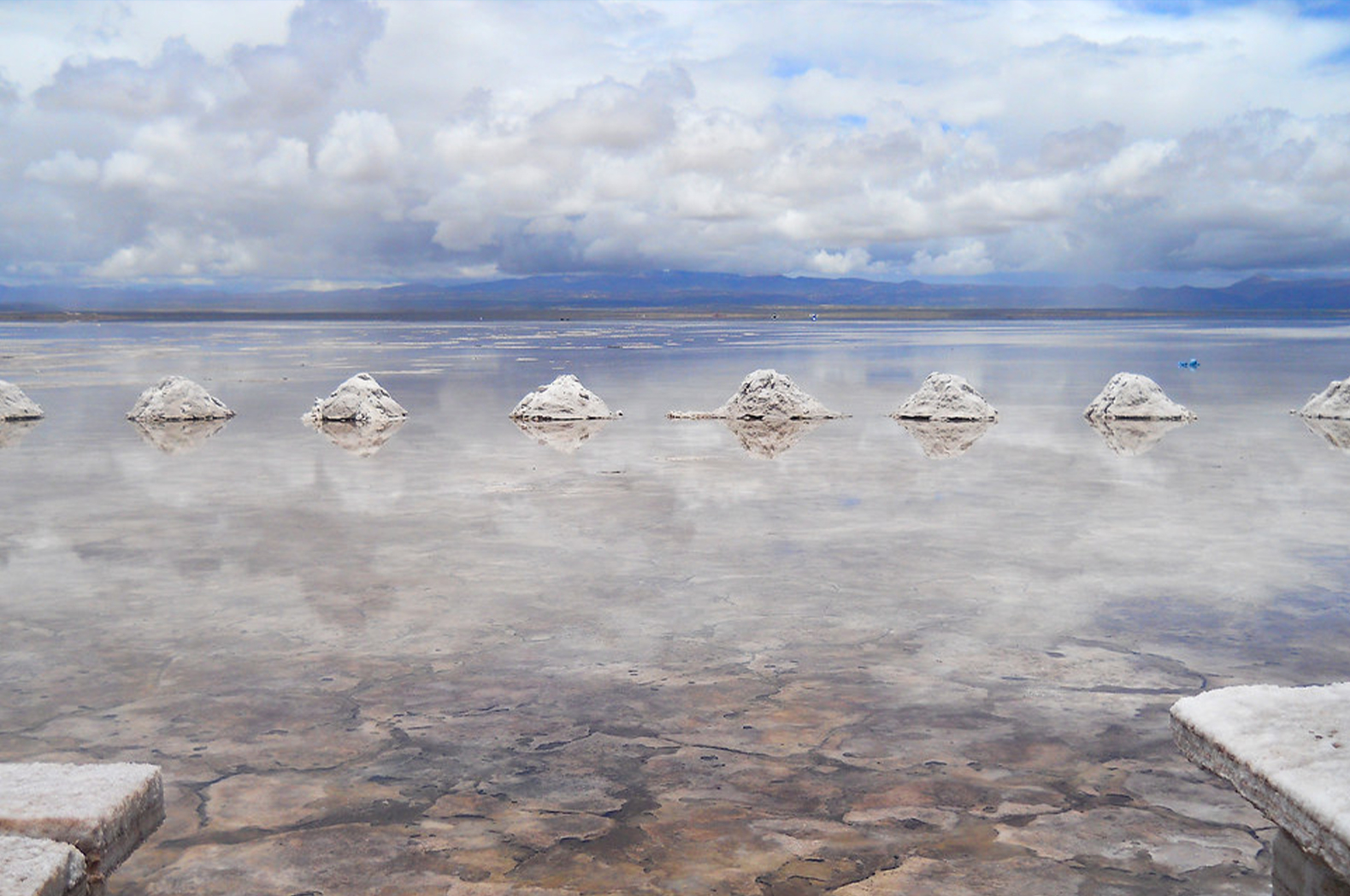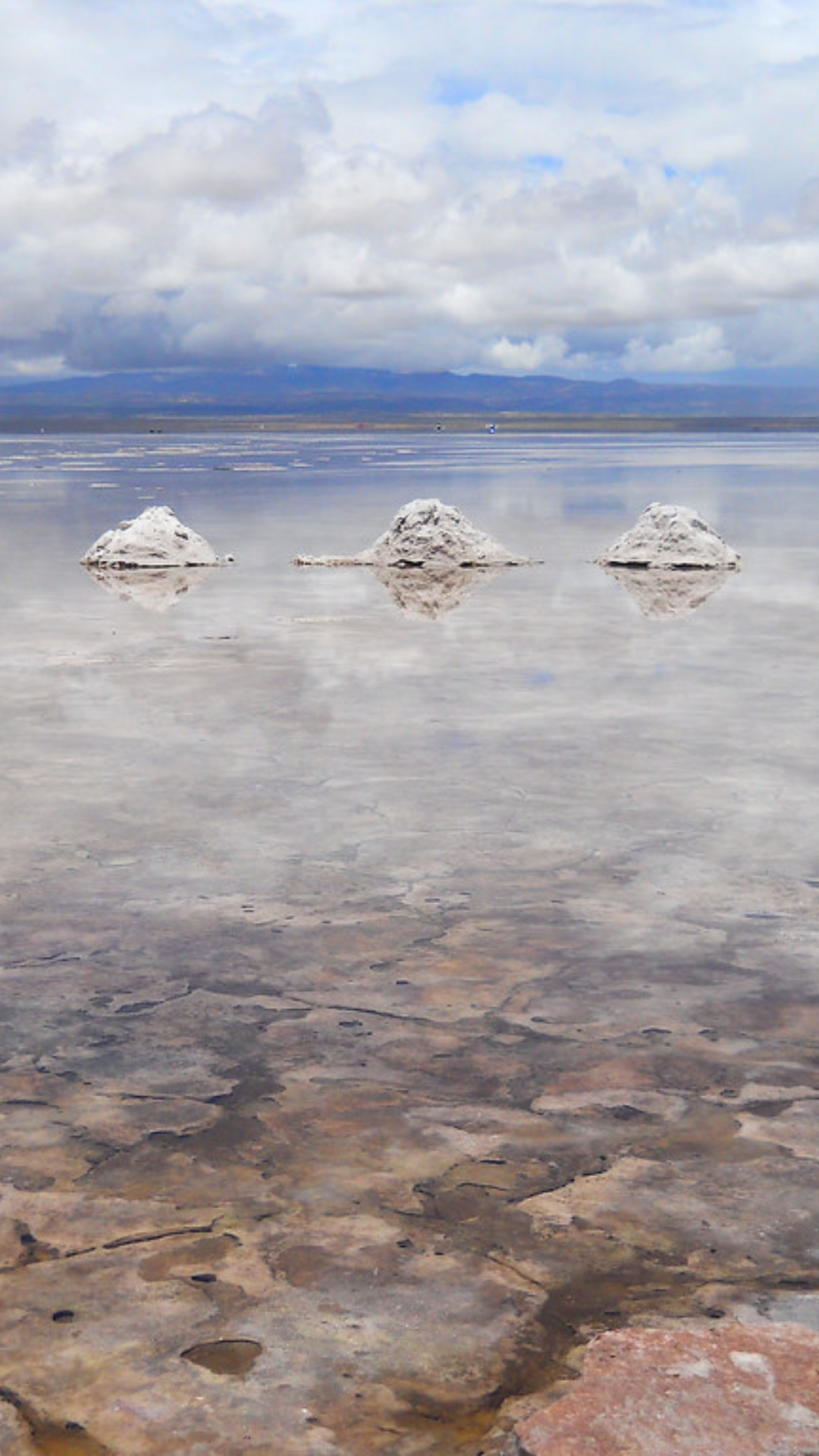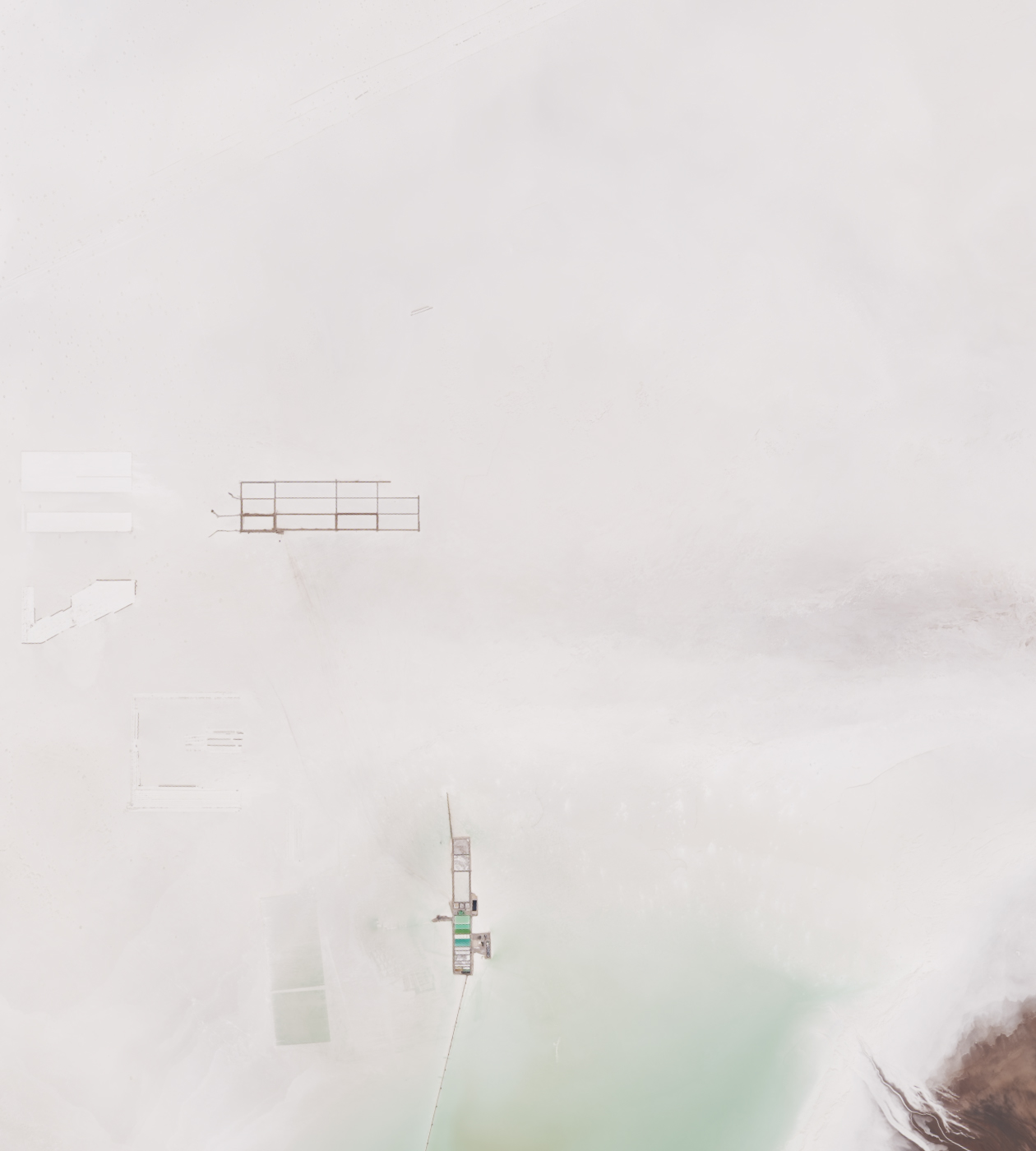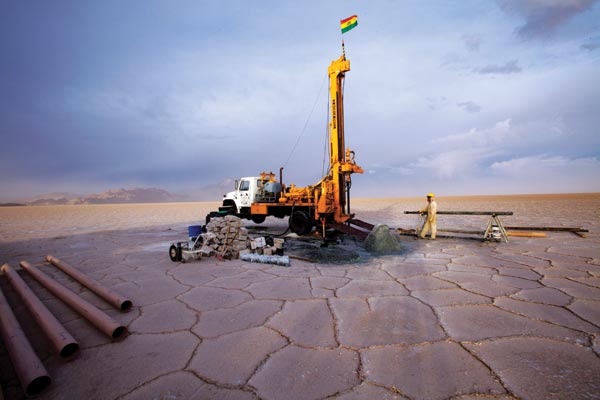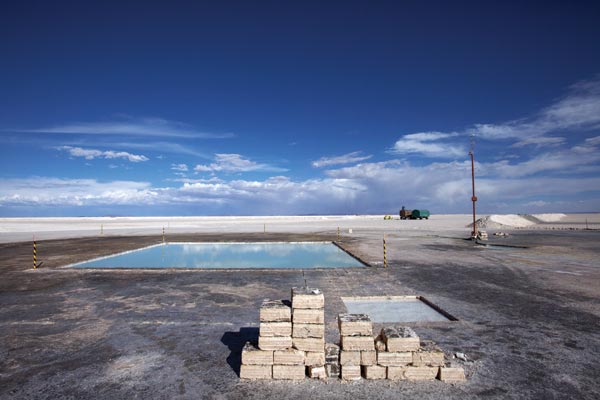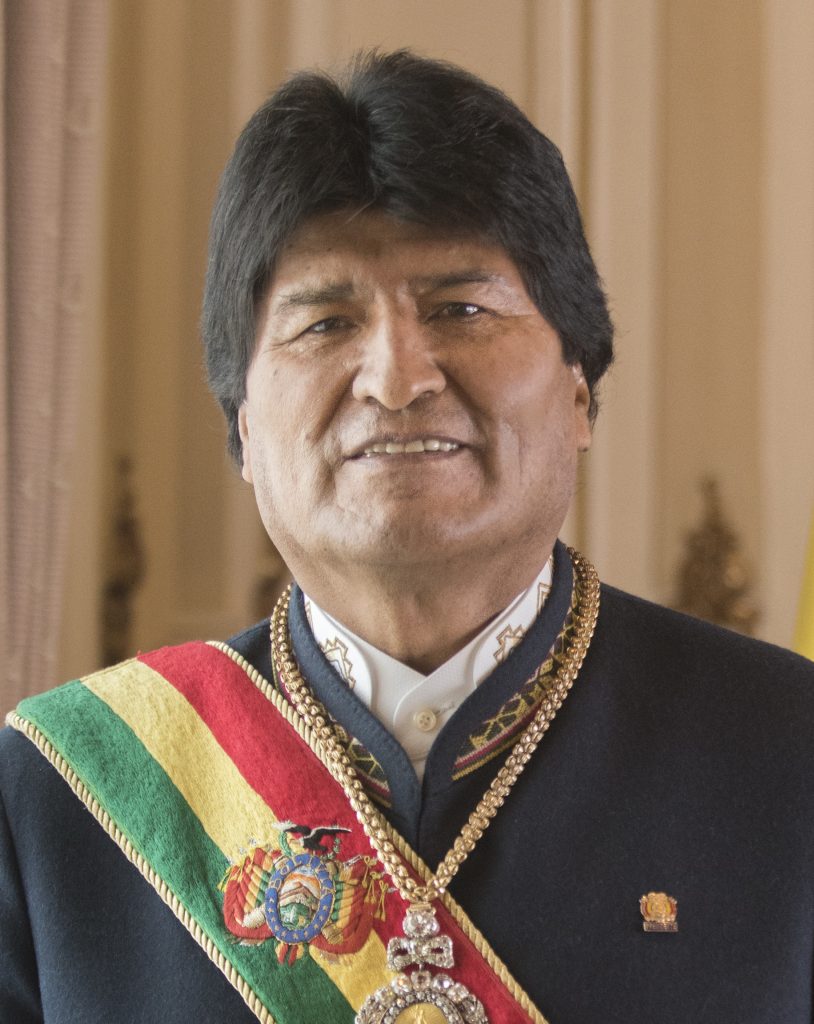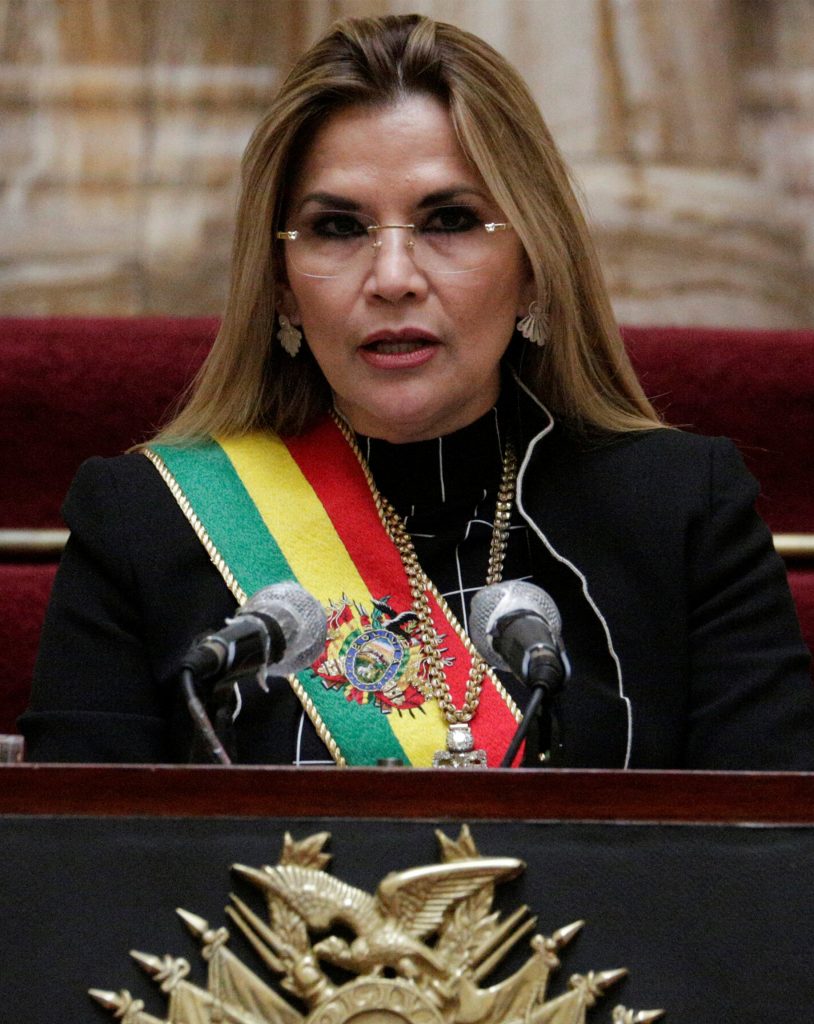Introducing a three-part series exploring the current state of South America’s “Lithium Triangle,” comprising Bolivia, Argentina, and Chile. We’ll explore the challenges each country faces in successfully mining and monetizing “The New Oil.”
The area of South America known as the “Lithium Triangle” is both a catchy moniker and a geopolitical oversimplification. The triangle comprises Bolivia, Argentina, and Chile, three nations that share a vast expanse of salt flats housing 75% of the world’s lithium. Although the U.S. still gets a majority of its lithium domestically – or, in Tesla’s case, from Australia – South American lithium will play a pivotal role in the global transition to electric vehicles. As a result, the United States is eager to influence the region.
Take the Biden administration’s Bipartisan Infrastructure Bill, passed in Nov. 2021, that aims to establish a functioning supply chain for battery materials by 2030. Some estimates show that, by 2050, electric cars will make up 31% of the global fleet. By examining how these three countries work in tandem, and where their philosophies on lithium extraction differ, the reality of this “triangle” is clearer than ever. No one side of the Lithium Triangle is in the same state of development as the next, and those differences are going to matter now more than ever.
Historically, the United States has had trouble resisting the urge to stick its nose in Bolivian affairs. The 2006 election of Evo Morales — a vocal critic of the US since he took office — only escalated that interference. In 2013, a now-infamous incident saw Morales’ plane grounded in Austria based on unfounded claims from the US that he was harboring whistleblower Edward Snowden on his presidential aircraft.
- NASA’s Operational Land Imager (OLI) on Landsat 8 acquired the first image of the salt-encrusted landscape of Salar de Uyuni (above) on April 12, 2013.
- Nearly six years later, the size of the lithium mining facility at Salar de Uyuni had grown significantly. NASA OLI image captured on Jan. 7, 2019.
The Salar de Uyuni salt flats, home to the world’s largest known lithium deposits, have become a white whale in the mining industry. What makes Salar de Uyuni such an enticing prospect for investors is that “underneath the flats, large aquifers rich in lithium brine are to be found.” As an alternative to extracting from hard rock, lithium brine extraction is hugely beneficial for Bolivia. In addition to being less environmentally invasive, this extraction method is more cost-efficient and takes less time to develop. Bolivia’s state-run lithium company YLB officially partnered with the German-owned ACI Systems Alemania (ACISA) in April 2018 to export upwards of 80% of their national lithium supply. The agreement was a landmark achievement for the Morales administration, which had prioritized the development of a plan for the country’s lithium since 2008, on the condition that it would foster economic development for Bolivia’s working class.
Since the 2019 US-backed coup in Bolivia that sought to expel the democratically elected president Morales, the future of Bolivia’s lithium has reached new heights of uncertainty. Previous attempts to mine the country’s 21 million tonnes (or metric tons) of lithium, which accounts for at least 25% of the world’s supply, have all come up short. Recently, a renewed focus on the Morales administration’s Bicentennial Agenda has led to a second attempt to commercialize the Bolivian lithium industry. The administration’s plan lays out a strategy for industrializing Bolivia’s natural resources and aims for significant progress by 2025, the 200th year since Bolivia’s founding.
YLB selected ACISA out of eight possible candidates. According to an article in MercoPress, the deal would allow Volkswagen AG, the largest automaker in Europe, to launch upwards of 80 new hybrid models by the mid-2030s. The agreement was contingent upon the Morales administration’s terms, which included processing plants built on Bolivian land that would provide jobs to the lower-income residents of La Paz and a 51% ownership stake for YLB. For the German-owned ACISA, doing business with the Morales administration meant understanding that “Bolivia’s intention was not to find a partner in the biggest markets, rather one that provides support along the complete value creation chain,” as one of the company’s spokespeople stated in the wake of the 2019 coup.
The success that YLB and ACISA saw during the first year of their partnership only served to further strain Bolivian relations with the United States. Losing out on what would have been billions in lithium revenue finally drove the US to back a coup.
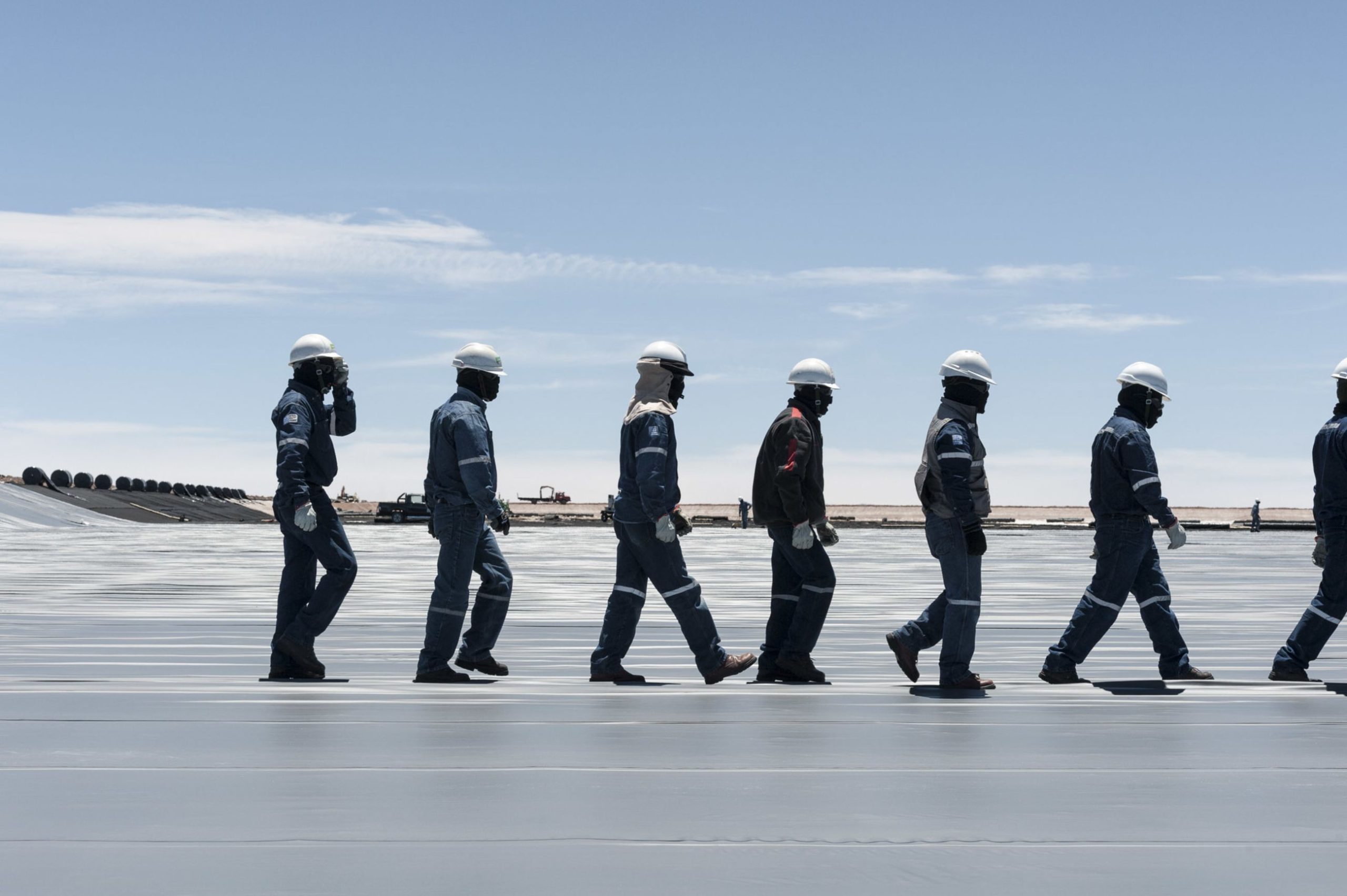
Workers walk on an industrial pool inside the Salar de Uyuni. Reaching the lithium mines is difficult and workers return home after two-week shifts. Image courtesy of Marcelo Perez del Carpio/Bloomberg.
There were whispers about the US response to Bolivia as soon as YLB and ACISA opened a lithium technology center in Potosi and debuted the first domestically-made electric vehicle three weeks before Morales won his fourth term in office. On Oct. 20th, 2019, just after Morales received a landslide 47% of the popular vote, a growing minority of protestors in Potosi who opposed the technology center and had been calling for a 3% to 11% increase in project royalties suddenly had the support of Bolivia’s military despite multiple violent altercations with police in the previous weeks.
Williams Kaliman, then the commander-in-chief of the Armed Forces of Bolivia and a longtime Morales supporter, quickly turned his back on his former ally and publicly called on Morales to resign, in an effort to bring weeks of violent clashes between protesters, counter-protesters, and the Bolivian police to an end. “Given the escalating conflict the country is facing, and in order to secure the life and safety of the population, we suggest that the president resign his presidential mandate and allow the pacification and re-establishment of stability for the good of Bolivia,” Kaliman said during a press conference that preceded Morales’ resignation just hours later.
The Morales administration, facing military occupation and a series of faulty election audits from the Organization of American States (OAS), officially withdrew from their ACISA partnership on November 4th. Morales resigned from office on November 11th, 2020, and Jeanine Áñez immediately stepped in as interim president. A particularly dystopian commendation from former president Donald Trump described Morales’ resignation as a “significant moment for democracy” noting that his “departure preserves democracy and paves the way for the Bolivian people to have their voices heard.”
- Workers operate a perforation drill to probe for brine up to 50 meters beneath the surface. Image from Antonio Regalado/MIT Technology Review.
- Lithium brine is pumped into evaporation pools. The sun evaporates water, gradually concentrating the lithium. Image from Antonio Regalado/MIT Technology Review.
The OAS – a coalition of North, Central, and South American nations that collaborate to monitor and regulate economic and political activity within the Americas – already had more than a few reasons to want Morales out of power before the 2019 coup. Morales successfully nationalized Bolivia’s gas and water industries in defiance of the IMF, allowing Bolivia to emerge as a sovereign nation outside the bounds of an imperialist stronghold. By eliminating reliance on the IMF’s predatory lending and the conditional support of the OAS that would leave Bolivia subject to Electoral Observation Missions, among other regulatory restrictions on economic and political development, the Morales administration was free to develop Bolivia as they saw fit.
It’s also crucial to understand the ethno-racial stakes of Morales’ tenure: he was the first indigenous president in a country that has a majority indigenous population. His administration had implemented its political agenda while cutting Bolivian poverty in half. In turn, his ambitions to commercialize the lithium industry were all the more probable and more dangerous in the eyes of the encroaching United States.
Áñez spent most of 2020 trying and failing to garner the support of the Bolivian people while dismantling Bolivia’s public companies in the interest of privatization. She then botched the country’s coronavirus response, buying only 170 ventilators for more than 27,000 dollars each, with the help of a loan from the Inter-American Development Bank. Later, the Áñez administration would throw Bolivia’s health minister under the bus, launching a corruption investigation that aimed to redirect blame to the very same healthcare infrastructure she was responsible for destroying.
- Evo Morales served as the 65th President of Bolivia from 2006 to 2019. Image courtesy of Wikimedia Commons.
- Jeanine Añez, a Bolivian lawyer and politician who served as the 66th president of Bolivia from 2019 to 2020. Image from David Mercado/Reuters.
Despite this, the tide has begun to turn, starting with the election of former finance minister and Morales successor, Luis Arce, and the subsequent charges of sedition and terrorism against ex-interim President Áñez for her role in the coup. Bolivia finds itself in a particularly precarious position. Amidst ongoing economic and political instability in the wake of the country’s need to rebuild, Bolivia continues to be susceptible to the same interference that led to Morales’ ousting in 2020. Perhaps lending itself to a bit of cautious optimism, Bolivia recently launched pilot programs with eight companies, including four from China and two from the United States, with the aim of revitalizing the Morales administration’s Bicentennial Agenda.
With the advent of Bolivia’s pilot programs, it’s clear that Morales and Arce are ready to pick up where they left off with 21 million tonnes of lithium up for grabs. In terms of who’s getting it, US-based companies are hoping to succeed where the US government failed. A recent New York Times profile of EnergyX CEO Teague Egan quotes the young mogul with gems like, “In Bolivia, they are so sensitive about politics. I just don’t understand why they should not do what is in the best interest of the country. I can only control what I can control,” demonstrating just how woefully unprepared many domestic companies are going to be when dealing with Bolivia.
Sentiments like Egan’s, coupled with Elon Musk’s 2020 tweet stating that he’ll “coup whoever we want! Deal with it.” show a complete lack of respect for Bolivia’s sovereignty. With the US still reeling from its failed attempt to dismantle that sovereignty, opposing deals from companies in China, Canada, or Germany may be inherently more attractive than offers from US-based projects like EnergyX, even with “virtually no help from the US government.” Regardless, the subsequent decisions from the Morales-Arce administration will be crucial ones, especially as lithium’s “new oil” reputation continues to spread.
